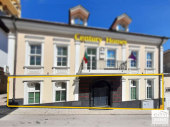Website # 1 for rental properties in Veliko Tarnovo. Residential, Holiday & Commercial properties to rent.
Feb 09, 2026 03:00
| Newsletters Sign-up | |||||||||||
|
|||||||||||
| Tackling fraud | ||
 Fighting fraud and corruption has become an increasingly important goal for businesses, but the economic recession put a severe dampener on their ability to do so, a global survey by Ernst&Young said in May.
Fighting fraud and corruption has become an increasingly important goal for businesses, but the economic recession put a severe dampener on their ability to do so, a global survey by Ernst&Young said in May.Widespread awareness of the reputational, legal and commercial risks led many companies to put in place the basic elements needed to detect fraud and ensure compliance with anti-corruption statutes, but few companies had sustainable fraud and corruption risk management frameworks in place, according to the report’s authors. A total 16 per cent of the respondents said that their companies had fallen victim to fraud over the past two years, compared to 13 per cent in the 2008 survey. Western Europe showed one of the most drastic increases in that respect, with 21 per cent of respondents reporting significant fraud, from 10 per cent in the previous survey. The same number was reported by Latin American respondents, followed by Africa and the Middle East (18 per cent) and Central and Eastern Europe (14 per cent). "Given the credit crunch and the ensuing recession in most economies over the past two years, perhaps this is not surprising. The financial crisis has increased the pressure on those at the top of major companies to maintain corporate results in ever more difficult conditions. The financial crisis has also caused companies to look more closely at their costs and the quality of their earnings, which has led to more pre-existing fraud schemes being detected," the report said. Corporate management awareness of fraud-related issues increased, with board members concerned about their personal liability, a point flagged by 76 per cent of respondents in the survey. "However, despite the boards’ concern, they do not appear to be behaving in a way that would increase their own protection. Worryingly, only four out of 10 chief financial officers (CFOs) interviewed had been asked to perform a review of anti-fraud and corruption controls in the previous 12 months, and only 28 per cent had been asked to produce a fraud risk assessment," the report said. "Results were generally better in North America than elsewhere, but results from Central and Eastern Europe were particularly concerning, with only 18 per cent of respondents having been asked to conduct a fraud risk assessment." The very same credit crunch that prompted a closer look at the corporate bottom line was also eroding the resources needed to sustain anti-fraud initiatives, forcing companies to make cuts in personnel, site visits and other measures. "Personnel reductions are particularly significant, as many of those cut are middle managers or other functions that are core to an effective control environment. Without them, the separation of duties and other key internal control systems will suffer," the report said. With signs of economic recovery multiplying, more than half of the survey’s respondents said that they expected their company to grow over the next 12 months, possibly through expansion on new markets or through acquisitions. The inherent fraud and corruption risks, however, were being disregarded by a large share of the respondents – 30 per cent said that they rarely or never carried out thorough pre-acquisition due diligence (38 per cent in Central and Eastern Europe) and 42 per cent said that their companies rarely or never did post-acquisition due diligence (43 per cent in Central and Eastern Europe). "A renewed merger and acquisition strategy also raised more specific concerns among our respondents. Forty-eight per cent of chief legal officers interviewed are worried by competition risks arising from a push for growth, while 45 per cent of chief compliance officers reported that data security will be a significant issue in the next 18 months." According to David Stulb, Ernst&Young’s global fraud investigation and dispute services leader, "when growth returns, we expect more challenges, more potential for fraud, more exposure to corruption and more interest from regulators. In the coming months, if they haven’t done so already, companies will need to review or improve their procedures to achieve long term sustainable and ethical growth." Ernst&Young 11th Global Fraud Survey is based on interviews with 1409 senior decision-makers from companies in 36 countries across the world, although Bulgaria was not one of them. Respondents were mainly CFOs and heads of internal audit, legal services and compliance departments in their respective companies. |
||
| Tuesday, Jun 01, 2010 | ||
|
| » 3 HOT OFFERS | ||||||||||||
|
||||||||||||

